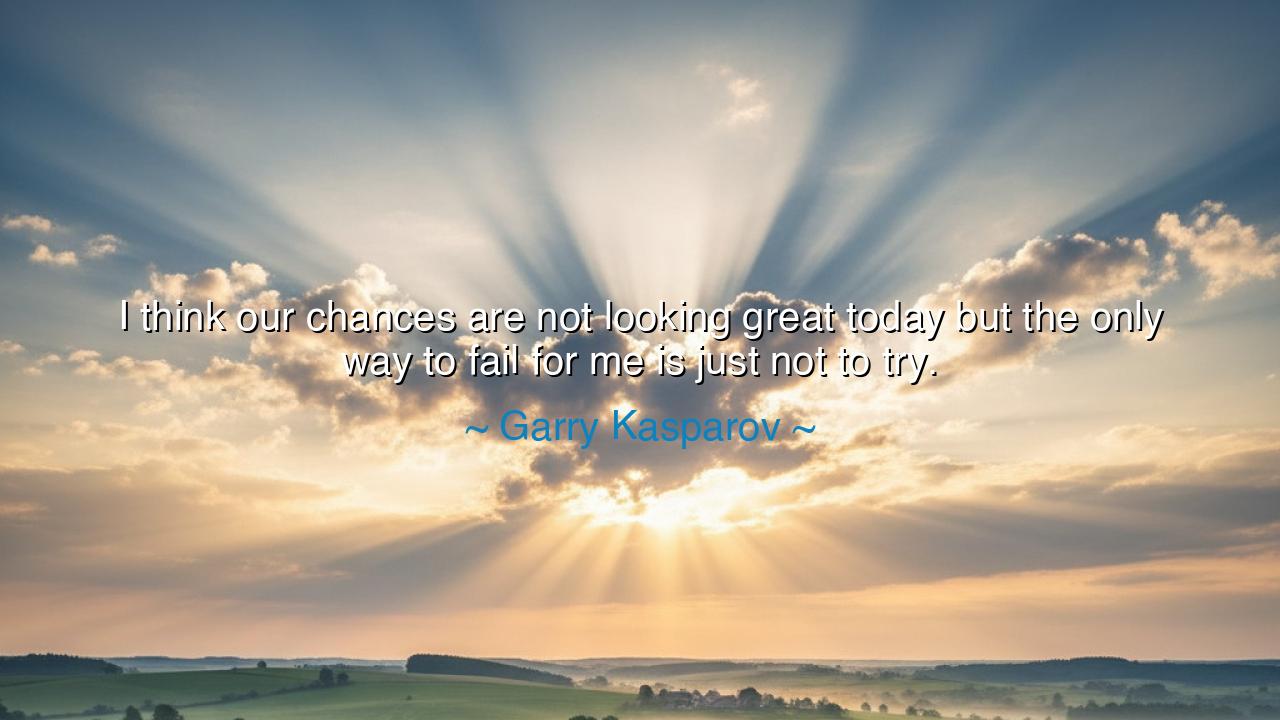
I think our chances are not looking great today but the only way
I think our chances are not looking great today but the only way to fail for me is just not to try.






“I think our chances are not looking great today, but the only way to fail for me is just not to try.” Thus spoke Garry Kasparov, the great master of the chessboard, warrior of mind and spirit, whose battles were not only against opponents, but against the limits of human will itself. These words, born from the heart of one who has faced both victory and defeat, stand as a timeless truth: that failure lies not in falling short, but in refusing to rise. For in every endeavor — whether of war, art, science, or the soul — the measure of greatness is not the certainty of success, but the courage to attempt the impossible.
Kasparov uttered these words in the heat of struggle, when the outcome was uncertain and the odds stood against him. He was not speaking as a man defeated, but as one who understood the essence of effort and purpose. For he, who had once ruled the chess world as its king, faced in his later years a new and mighty adversary — not a human mind, but the machine intelligence of IBM’s Deep Blue. The contest between man and machine was more than a game; it was a symbol of the eternal battle between will and inevitability, between the human heart and the cold perfection of logic. When Kasparov declared that “the only way to fail is not to try,” he proclaimed the eternal creed of the human spirit: that the act of striving itself is victory.
In the ancient world, men of wisdom spoke similarly. Aristotle taught that excellence is not an act but a habit — a pattern forged through countless attempts. Homer sang of heroes who went to war not because victory was guaranteed, but because honor demanded the attempt. So too did Kasparov, modern hero of intellect, echo the voices of the ancients: that greatness belongs not to those who always triumph, but to those who refuse surrender, even when the horizon darkens. His words remind us that hope is not a calculation of odds, but a choice of the heart — a vow to fight while strength remains.
Consider the story of Ernest Shackleton, the explorer who set out to cross Antarctica in 1914. His ship, Endurance, was crushed by ice before he even reached the continent, leaving his crew stranded in the frozen wilderness. By all logic, their chances were not looking great. Yet Shackleton refused to yield. Through months of hunger, cold, and peril, he kept his men alive, navigating storm and sea with unbroken resolve. Not a single life was lost. Shackleton, like Kasparov, understood that the line between failure and victory is not drawn by outcome, but by effort — by the refusal to stop trying when all seems lost.
To say that “the only way to fail is not to try” is to declare faith in the unseen powers of perseverance. Many men measure their lives by results; the wise measure theirs by effort. For results depend on fortune, but effort depends on the soul. The farmer cannot command the rain, but he can sow his seed with diligence; the poet cannot ensure remembrance, but he can pour truth into every line; the warrior cannot know victory, but he can fight with honor. Thus, in every age, the gods favor those who try.
Yet Kasparov’s words also hold a deeper warning: that the fear of failure is a far greater enemy than failure itself. Those who never begin will never grow, and those who demand certainty will never create. The act of trying — of stepping beyond the comfort of safety — is the birth of all progress. The inventors, the prophets, the reformers of every age stood before ridicule and risk, and pressed forward nonetheless. To them, as to Kasparov, failure was not defeat, but the crucible through which destiny is forged.
Therefore, O listener and seeker of truth, remember this: do not pray for easy chances, nor despair when the path is steep. The worth of your life will not be measured by how many times you succeed, but by how many times you dared. When the night grows dark and the outcome uncertain, remember the chess master’s wisdom: to try is to live, and to cease trying is to die. Gather your will as the warrior gathers his sword; fix your gaze upon your purpose, and step forward — even if victory lies beyond the horizon.
For as Garry Kasparov showed the world, the spirit of man is greater than any obstacle, greater even than defeat. The body may tire, the mind may falter, but the will to strive — that sacred fire — is the mark of true greatness. Thus, the lesson stands eternal: the only way to fail is not to try. Try, therefore, with all your heart, and you will have already triumphed — not in the eyes of the world, but in the sight of eternity.






AAdministratorAdministrator
Welcome, honored guests. Please leave a comment, we will respond soon